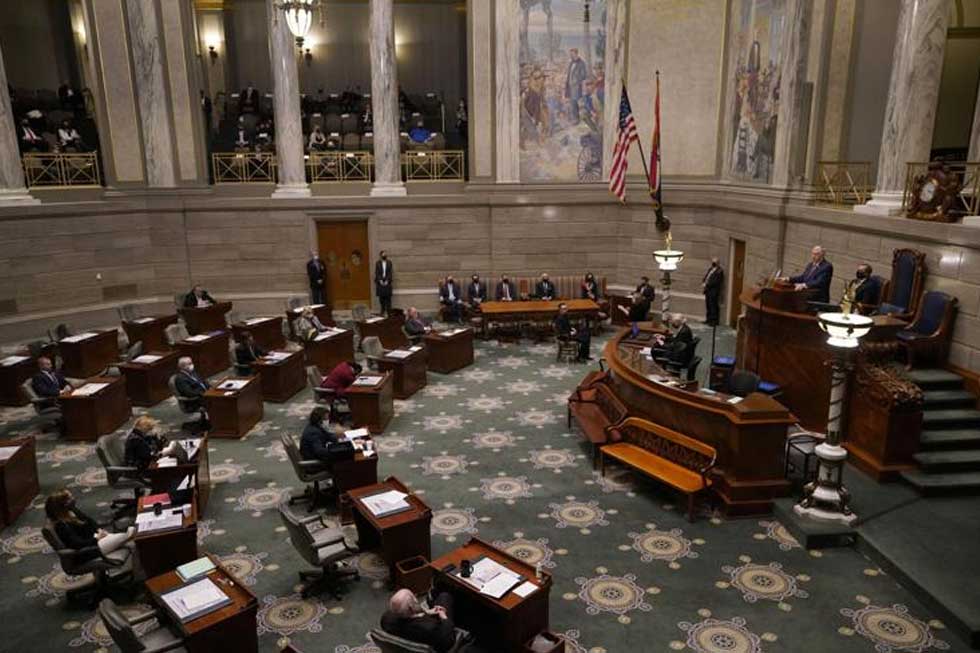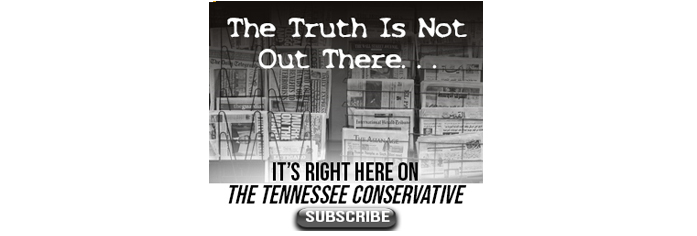On The Same Day The Missouri Senate Debated 17 Hours Into The Predawn To “Perfect” A COVID-19 Business Liability Protection Bill, The Missouri House Made Short Work Of Passing A Bill Prohibiting State Law Enforcement Agencies From Enforcing Federal Firearms Regulations.
Photo: Missouri Gov. Mike Parson delivers the State of the State address Wednesday, Jan. 27, 2021, in Jefferson City, Mo. The speech is traditionally given in the House chamber but was moved to the smaller Senate chamber at the last minute due to concerns about the coronavirus.
Photo Credit: Jeff Roberson / AP
Published February 4, 2021
The Center Square [By John Haughey]-
House Bill 85, the ‘Second Amendment Preservation Act,’ sponsored by Rep. Jered Taylor, R-Nixa, advanced to a final House floor hearing Wednesday in a 107-43 mostly partisan vote.
The measure would invalidate federal laws or “other actions deemed to infringe on a person’s Second Amendment right to bear arms,” while claiming not to infringe on federal authority to enforce federal gun laws in Missouri.
All Missouri gun laws would remain in effect under the measure, which is one step away from adoption by the chamber and transferal to the Senate where a similar ‘Second Amendment Preservation Act’ awaits a first floor hearing.
Sen. Eric Burlison’s, R-Battlefield, Senate Bill 39 was advanced by the chamber’s General Laws Committee on Jan. 26.
Burlison sponsored the same bill last year but did not get a Senate hearing and, most notably, the 2013 ‘Second Amendment Preservation Act’ that lawmakers adopted but was vetoed by then-Gov. Jay Nixon, a Democrat.
During a Jan. 19 hearing before the General Laws panel, Burlison predicted President Joe Biden’s administration and the Democrat-controlled Congress will pursue an aggressive gun control agenda featuring “gun bans directly, magazine bans, attacks on private gun manufacturers, red flag laws and restrictions on individual citizens from buying firearms.”
That same fear was expressed by House Republicans during Wednesday’s deliberation on HB 85, countered by Democrats amplifying concerns by state law enforcement officials about the potential ramifications on task force collaborations with federal agents and grant funding.
Lewis County Sheriff David Parrish has raised issues with some of the bill’s language and Greene County Sheriff Jim C. Arnott has circulated a letter asking lawmakers to reject the bill.
“We need state laws that will make it easier to keep our communities safe, not those that have unintended consequences and silence law enforcement officials,” Arnott’s letter said.
Taylor’s originally filed ‘Second Amendment Preservation Act’ held individual law enforcement officers liable to fines and lawsuits if found to “knowingly enforce or attempt to enforce federal gun laws nullified in Missouri.”
Taylor Wednesday secured approval for an amendment shielding individual law enforcement officers from financial liability, but allowing those deemed illegally infringed to sue police departments with violation incurring minimum fines of $50,000.
Rep. Peter Merideth, D-St. Louis, found Taylor’s amendment to make police departments liable for paying violation fines and exposed to lawsuits a bit ironic.
“In other words,” he queried, “if we don’t like the way a department is behaving, we should defund the police?”
No, Taylor said, but when police violate citizens’ constitutional rights, they must be held accountable.
“We’re not preventing those funds from going to the department,” he said.
With Republicans holding a 24-10 Senate majority and a 114-49 House advantage, the measure is likely to be adopted this year, especially since Missouri’s Republican Attorney General Eric Schmitt has not expressed an opinion on the ’Second Amendment Preservation Act,’ repeatedly declining media requests for comment.
If so, Missouri would be among a dozen states that adopted federal gun regulation nullification bills during the Obama administration, particularly between 2010-13.
It is unlikely the mostly symbolic measures would withstand court challenges. The U.S. Supreme Court in its 1958 Cooper v. Aaron ruling explicitly determined federal law ”can neither be nullified openly and directly by state legislators or state executive or judicial officers nor nullified indirectly by them through evasive schemes.”





